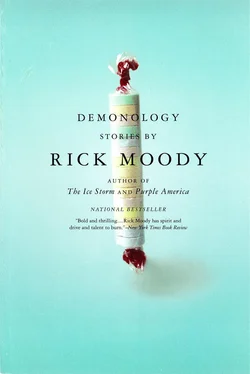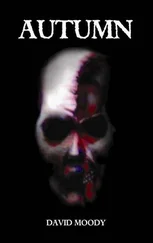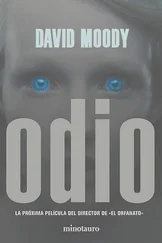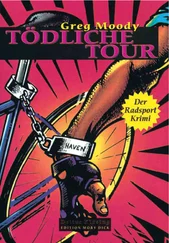Just as this easy-listening nationalism took root, however, there was the shot heard round the world. The punk rock explosion! The revolution! Wow! Safety pins! In the space of a few short months, Wilkie Fahnstock turned away from the soft-rock conventions of the mid-seventies entirely and embraced instead the anarchic celebrations flowing out of London’s King’s Row.
Meanwhile, after years of loneliness and romantic starvation in high school, and with only the simple addition of a diet of beer, speed, and filched prescription medication, Wilkie Fahnstock suddenly achieved campus celebrity as an oddball, the guy with the Devo albums —just as he was being expelled from Andover for curfew violations. So it was back to Mamaroneck High to complete the twelfth grade without a letter in any sport. (I can report here that Fahnstock did, however, finally manage to “cop a feel,”as he put it, from Pauline Vanderbilt of Park Ave., NYC, a fellow An-dover casualty, while in the next room her close-and-play mangled a copy of Blondie’s “Heart of Glass.”Oaths of eternal fealty followed.)
At home in Westchester, Fahnstock managed to parlay acceptable board scores and indifferent recommendations into an acceptance at the University of Rhode Island, a school which (according to atlases available to the compiler of these notes) was a mere road trip from the recherche and enigmatic Moonstone Beach of the Rhode Island coast. A known nudist bathing location! Fahnstock, with his beer-related paunch and excessive chest hair, was often a sight at Moonstone playing, with various nursing students, volleyball en deshabille! The best music for nudism, at least in those days, was funk, and thus it blasted from the sound system of Fahnstock’s car. We located, in the glove box of his 1982 Volkswagen Rabbit, a battered compendium of funk and “new wave” classics to support the selections from this period.
In 1984, Fahnstock, turning aside the advice of his more liberal friends, and notwithstanding his countercultural personal habits, nonetheless voted in his first presidential election for former California governor Ronald Reagan. Proving that the G.O.P. can indeed be a big tent, he did not however endorse the conservative “hair”bands of the period — Poison, Ratt, Whitesnake, Loverboy. He concentrated instead on the nascent pop form known as “hardcore“: the sound of the empty landscapes of the American plains, without Dolby noise reduction or compression. Dairy farms in foreclosure. Permafrost. Songs a minute long, played at four hundred beats per.
A period of retrenchment followed, featuring a flirtation with the local, NYC-related phenomenon called Rap or Hip Hop. Fahnstock learned of it at after-hours clubs, where he spent far too many nights during these summers in col lege. Rap gave way almost immediately to various artists from the past, the Velvet Underground, Bruce Springsteen, Bob Dylan. And this organic past sustained him overland to rehab in Minnesota, where, admitting complete defeat (in Hazelden parlance) less than a month after graduation, he dogged female cocaine addicts and disdained a belief in God until transferred summarily to a halfway house in Queens. He then turned up briefly at confirmation classes at Greenwich Villages Grace Church.
A succession of bad day jobs gave way to a bad streak of sobriety jobs, as they are called in the demimonde of recovering types, at a succession of New York fashion magazines — in copyediting, and then fact-checking departments. At Self, for example, Fahnstock worked closely with beauty columnist Denise D’Onofrio, whose office beat box listed toward Janet Jackson and Paula Abdul, and whose gin and tonic he accidentally sipped at an Xmas party, scaring himself witless, such that he fled home on the PATH train to his sixth-floor walkup in downtown Jersey City, and didn’t come out again for a week. When he did, it was to relapse.
Have we spoken already of the Garden State and its influence on Wilkie Fahnstock? Of its flat, Netherlandish aspect? Of the local bands of Hobo-ken? How in the cauldron of that old waterfront town he went through a sort of flowering of compassion for fellow man, however short-lived, as evidenced by his sudden, precipitous decision to take in rehab acquaintance Kristina Ruiz, fleeing at the time a pugilistic husband, so that the two of them might share that tiny space, Wilkie’s apartment, chastely, platonically, until a furious row, after which Wilkie slunk home again to Westchester.
It was back under the roof of his stepfamily, two years sober, ashamed, unemployable, that Wilkie Fahnstock first saw the MTV video (measuring worth-lessness by the amount of daily consumption of that channel) for a song entitled “Smells Like Teen Spirit.”Another relapse ensued. However, his sheer delight in the movement of rock and roll fashion — in the direction of the so-called grunge music — revivified Wil-kie Fahnstock enough to apply to law school, financed mainly by his reinforced-carton magnate stepfather. This plan lasted about one year (1994), as did Wilkie’s marriage, contemporaneously, to law classmate Arlene Levy, of Scarsdale. On the occasion of their first anniversary, Arlene informed her own parents that Wilkie’s refusal to study, his concentration on such disagreeable racket as The Shaggs, and his crack binges were unacceptable. Thus, Wilkie took an apartment by himself in Park Slope, Brooklyn, and began to write his roman à clef (untitled), of which, after six months, he completed thirteen pages. Applications to the writing and film programs of city institutions were to no avail.
Bringing us to the present. The tale, then, of a confused, contemporary young person, a young man overlooked by the public, a person of meager accomplishment, a person of bad temperament, but a guy who nonetheless has a very large collection of compact discs! For this reason, Bankruptcy Records presents to you the music of Wilkie Ridge-way Fahnstock in his thirty-third year. The last WASP (one of them anyway), the last of this nations culturally homogeneous offspring deluded enough to believe in the uniqueness of this cultural designation, a young man whose beloved rock and roll has finally apparently become a thing of the past, a quaint, charming racket from another eon. We present to you, ladies and gentlemen, the life and music of an undistinguished American!
Cassette One
(A)
“There was a lot of space in the living room to dance. My sister had a hula hoop and she used to put on Neil Diamond ’ s early work, like ’Mother Love’s Traveling Salvation Show.’ Now she ’ s a social worker in Sandusky, Ohio, with two kids named Jenny and Mike.“
1. Peter Ilyich Tchaikovsky (1840-93), 1812 Overture, Op.49, edit.
2. The Beatles, “I Saw Her Standing There”(1965).
3. The Beach Boys, “I Get Around”(1965).
4. Byrds, “Turn, Turn, Turn”(1967).
5. Bob Dylan, “Tambourine Man”(1966).
6. Otis Redding, “(Sitting on) The Dock of the Bay”(1968).
7. Tommy James & the Shon-dells, “Mony, Mony”(1969).
8. Jimi Hendrix, “The Star-Spangled Banner”(1969).
9. Simon and Garfunkel, “Bridge Over Troubled Water”(1970).
(B)
“The most important place to learn about music was on the AM-only radio dial of my mom’s station wagon. Cousin Brucie, Wolfman Jack, Imus in the morning, and Harry Harrison.“
10. Bobby Sherman, “Julie, Do You Love Me?”(1971).
11. Three Dog Night, “Mama Told Me Not to Come”(1971).
12. Smokey Robinson and the Miracles, “Tears of a Clown”(1970).
13. Jackson Five, “I Want You Back”(1971).
Читать дальше












